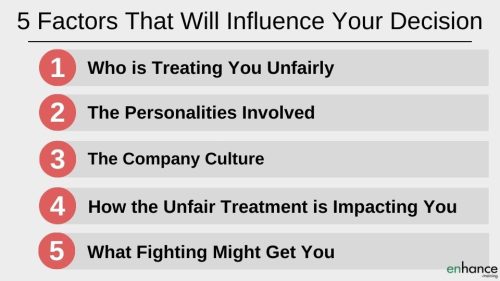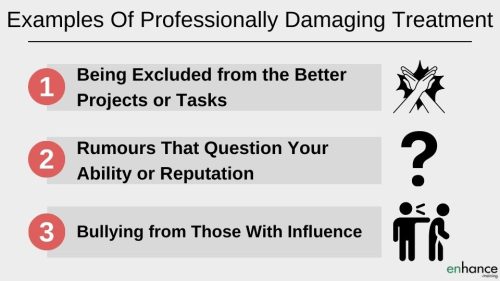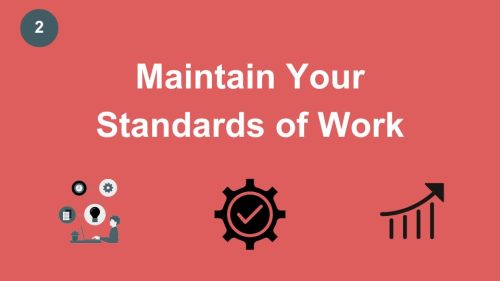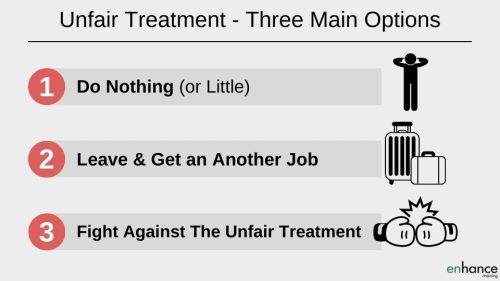Is it Worth Fighting Unfair Treatment At Work

“Is it worth fighting unfair treatment at work” is an important question and the answer is a very personal choice.
When you are being treated unfairly there are three main options. I share my views of when you choose each, what you gain from each option and what each option costs you as I have experienced them in my career.
You are in the best position to choose how you are going to respond to unfair treatment at work. Things that are going influence your choice include:
- Who is treating you unfairly – team members, colleagues, your boss, or other managers.
- The personalities involved
- The culture of the company you work in
- How the unfair treatment is impacting you?
- What fighting unfair treatment might get you
These are all common considerations, and you are likely to have more specific to your situation.
Is it Worth Fighting Unfair Treatment At Work?
- Do nothing or put up with the unfair treatment
- Leave and get a job at another company
- Fight against the unfair treatment at work
Watch on YouTube
Listen on Podcast
When you are being treated unfairly, you are likely to do a mix of these main options to handles unfair treatment.
Do nothing is always an option when thinking about fighting unfair treatment at work
Sometimes doing nothing or doing little is a very sensible option, particularly is the unfair treatment of you is pretty minor, an inconvenience or an annoyance. If the unfair treatment is only going to be for a short time, you might also choose to do nothing . An example might be when you have to handle an unfair manager on a short project which due to end soon.
Other situations where you might decide to pursue the do nothing option could be a manager in another part of the business has taken a dislike to you. You don’t have many dealings with them, so the impact of the unfair treatment is fairly minor so doing nothing is a sensible option.
What is the impact on you?
As the impact of the treatment on you personally or your career prospects rises, doing nothing becomes a less and less sensible option.
For instance if you are getting emotionally battered or hurt, on a daily or weekly basis then doing nothing is not a great option. Social exclusion, others gossiping about you, false personal rumours being spread and similar are likely to upset you.
If your career prospects or your professional reputation are being damaged, then doing nothing about unfair treatment is not a good option. Examples might include
- being excluded from the better projects or tasks that represent development for you,
- gossiping or rumours that question your ability to do your job or question your attitude or
- bullying from those with influence within the business.
Early in my career, I chose to do little when I started in a new job and a peer of mine who had been in the business for years felt that I was a threat to her position. She made my life difficult with social exclusion tactics, gossiping and snide comments. On a personal level this was pretty hurtful and knocked my confidence a bit. I don’t think her unfair treatment impacted my job or career prospects. At the time I felt resilient enough that this treatment was more of an annoyance rather than a major issue. And yes, I did try to build bridges with her but was not very successful. She moved jobs so the problem left with her and I was very relieved.
Decide where your line is. What will doing nothing cost you and what will you gain from it. If the impact or pain is too high, then learn how to handle unfair treatment, go elsewhere or fight the unfair treatment at work.

Leave and getting a job elsewhere is common option when receiving unfair treatment at work
If the impact or the pain of being on the receiving end of unfair treatment at work is too much for you to ignore, then leaving and getting a job elsewhere is a good option for your health, happiness, and career prospects.
If you are unhappy at work, you will not be motivated to do your best work. If you are unhappy for more than a short period, it will impact your career prospects, your reputation, how your manager views you, how your colleagues respond to you and so on.
Don’t choose to stay in a job where you are unhappy, unmotivated, or not doing a good job for more than a short period. Getting a new job is a hassle, takes time and work in the short term. Staying put is much worse for you in the longer term if the unfair treatment at work persists.
If you are not a resilient person or really struggle with conflict, then fighting unfair treatment at work may be a step too far for you. This is absolutely okay. It takes a lot to fight an unfair boss or colleagues and often you don’t get much benefit compared to the trauma you go through.
Leaving can have great outcomes
Early in my career, my manager at the time left, and I got a new line manager. I was the least experienced of my peers looking after the divisions that paid the biggest bonuses. My new manager didn’t like this and made my life difficult to get me to leave. I didn’t know how to fight this at the time so got a new job and left. My ex-manager promptly took over the divisions I used to look after. Most important for me was the new job I started was a massive positive turning point in my career, so I have a lot to thank my worst manager for.
Leaving is a good option if you get a better job in a company that appreciates you more. Always keep getting another job as an option!

Is it worth fighting unfair treatment at work?
Choosing to fight or not is a very personal choice and there are loads of factors that you are likely to consider before making the choice to fight unfair treatment at work.
Who is treating you unfairly at work, bullying you or undermining you is a big big factor.
For instance if it is a colleague, then you have much wider options and the chance of successful action is a lot higher. With colleagues it is easier to get the support of your manager and other more senior people in the business to apply pressure on them to stop.
Gaining support without coming across as a manipulative, or difficult person, or someone with a grudge requires you to get evidence or at least record instances of what was said by whom. Getting other witnesses to support your version of events will help your credibility considerably.
Whenever you are being treated unfairly, manage your own behaviour and reactions carefully. You don’t want doubt being cast over your behaviour or your account if an investigation is undertaken.
If you are being treated unfairly by a more senior person other than your manager, building support with your manager and other senior managers is essential to be successful if you decide fighting unfair treatment at work is your preferred option.
If you have an unfair boss
If you have an unfair boss, then you will be in for a painful tough fight which is much more likely to be unsuccessful. You will need to build even more support with other managers and gain the support of HR. The culture of the company is also a big factor.
Fighting unfair treatment from those more senior that you is tough. It will take it out of you emotionally and the energy you put into the process will not be available to do your day job. Depending on the culture and senior management, you can get a good result for you. For instance I have removed a manager who was treating their staff poorly rather than remove the person complaining. In my experience, unfortunately, this is still quite rare.

Think through what you will gain
Before you decide to fight unfair treatment at work, think through carefully what you will gain. Weight this up against the personal cost of fighting. Think twice as long when considering “is it worth fighting unfair boss”. Think also about the personalities involved. For instance if you are up against a stubborn person who rarely changes their mind, any action you might take could mean escalation of the unfair treatment. Try to make sure the personal effort is worth the reward.
If you are a long serving staff member and you love your job and the company, then fighting against being unfairly treated at work might be a no brainer compared to leaving.
If you are newish in the role or there are lot of jobs you can happily get offers for, fighting may be a harder route to take without clear gain.
Think carefully about what you are likely to get versus the pain and effort you will go through fighting unfair treatment at work.
I personally have fought unfair treatment from my manager and in the end won convincingly. It was a hard and long fight, and it took a lot of energy, confidence, and resilience to get over the finish line. Because of pain and effort involved, I think I paid a high personal cost for the result I got. It was on balance worth it for that particular situation. I can promise you I would think very hard before going through it all again.
Do take a look at the decision tree mentioned earlier, available for free before deciding what to do.

4 useful tactics when fighting unfair treatment at work
Always take the time to build examples and evidence that show or indicate you are being treated unfairly. Gathering examples and evidence is gold dust for gathering support and being taken seriously by managers and HR. You can’t afford not to do it, even if it is hard and takes effort.
- You must ensure that you standard of work is at least maintained and increased if possible. This maintains or increases your value to the company and the managers looking at the situation.
- Undertake informal internal marketing to raise awareness of what you do and the value of the work you do to the business. This will help you to build support and counter the effects of an underminer or bully. Doing this will also increase your confidence. Do what you can even if marketing yourself is daunting to start with.
- Start looking for opportunities outside the company so you have a fall back plan and a job should the worst happen, and you are asked to leave.
Fighting unfair treatment at work takes a lot of time and energy. If you decide to go down this route, make sure a positive outcome is worth it to you personally.
And the very best of luck to you!

In summary
There are a lot of things to consider when deciding is it worth fighting unfair treatment at work. If you decide to fight, don’t expect it to be easy or without personal cost. Fighting might be better than doing nothing or leaving depending on your situation and your personality. I don’t think there are any easy routes out of a situation where you are being treated unfairly at work.
Do what you think is best for you after considering the people involved and the situation.
As a reminder, we have covered:
- Do nothing or putting up with the unfair treatment
- Leave and get a job at another company
- Fight against the unfair treatment at work
- 4 Tactics to undertake when fighting against unfair treatment.

I have personally experienced unfair treatment from colleagues and bosses multiple times in my career. Doing nothing, in my view, rarely stops the unfair treatment, and if dealing with a bully may even encourage it.
A lot of unfair treatment can be stop or resolved by pointing out the unfair treatment and asking the person to stop it. When it gets more serious, then deciding to fight against it or leave become the two main options we all consider.
Good luck.







